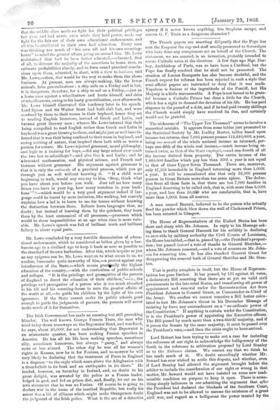On Wednesday Mr. Lowe made a very brilliant speech— shockingly
reported in the Times of Friday, and not apparently by telegraph—in Liverpool, on middle-class education. He remarked Mr. Lowe,—then, that would be the way to make them rise above business. At present, men are always making, like the lower animals, false generalizations ; a ship sails on a Friday and is lost, it is dangerous, therefore, for a ship to sail on a Friday,---just as a horse runs against a wheelbarrow and hurts himself, and shies at wheelbarrows, owing to his hasty generalization, ever afterwards. Mr. Lowe himself illustrated this tendency later in his speech. Lord Byron and Sir Walter Scott had both club feet, and were confined by them to their rooms in their boyhood, hence they set to reading English literature, instead of Greek and Latin, and became great literary men ; whence Mr. Lowe inferred that their being compelled to read English rather than Greek and Latin in boyhood was a great blessing to them, and might just as well have in- ferred that it was their being confined to their room in boyhood, and seeing nothing of nature, that inspired them both with so warm a passion for nature. Mr. Lowe rejected grammar, moral philosophy, and logic as a training for boys,—did any large school ever teach the two last to schoolboys ?—and also Gre-k and Latin ; and he advocated mathematics, and physical science, and French and German without grammar. His argument against grammar is that it is only the rationale of a practical process, which you go through just as well without knowing it. " If a child were beginning to walk, would any one say to him, Stop, think what you have about you before you walk. Just tell me how many bones you have in your leg, how many vertebrae in your back- bone ' " ?—which would be a very good argument indeed if lan- guage could be learnt by mere imitation, like walking, but scarcely explains how a lad is to learn to use his tenses without knowing the distinction between them. Infants learn languages thus, no doubt ; but instead of learning them by the quickest, they learn them by the least economical of all processes,—processes which would be sheer impossibilities at an age when time is more valu- able. Mr. Lowe's speech was full of brilliant truth and brilliant fallacy in about equal parts.































 Previous page
Previous page